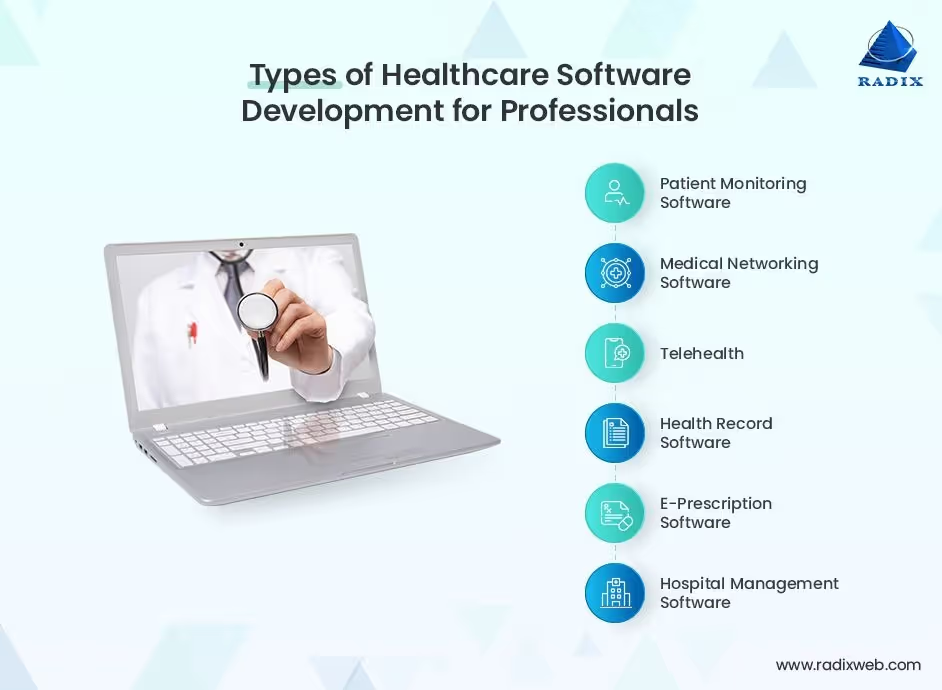Hiring software developers for healthcare is known to be challenging as it requires specific expertise and even with so many healthcare software development hiring sites out there, it can be a burden to try to figure out which is reliable and will be able to go through with your entire project. Many firms face legal issues and data breaches as a result of scammers and hackers as often, developers may require access to the company's system. Therefore, it is recommended to only hire developers via dedicated agencies that are pioneers to software outsourcing. In this blog post, we discuss the As and Bs of software development when it comes to the healthcare industry and how it can benefit the industry.
Java is the primary programming language of healthcare software systems. It's reliable, secure, and works well on different platforms. You'll often find it in large-scale projects like Electronic Health Records (EHR) and hospital management systems, where stability and scalability are key.
Python is a favorite in the healthcare industry because it's easy to read and write, making it perfect for tasks like data analysis and machine learning. As healthcare increasingly relies on data-driven insights, Python is used in everything from predicting patient outcomes to creating personalized treatment plans.
If you're dealing with Microsoft-based environments, C# is the go-to language. It's great for building Windows applications and is often used in medical imaging systems and healthcare management software, where integration with other Microsoft technologies is a must.
JavaScript plays a big role in making healthcare applications more interactive and user-friendly. Whether it's a telemedicine platform or a patient portal, JavaScript is the language that brings these web applications to life, often working hand-in-hand with frameworks like Angular or React.
SQL is essential when it comes to handling all the data in healthcare systems. It's used to store, retrieve, and manage patient information in databases, which is crucial for systems like EHRs and other data-heavy applications.
In the world of healthcare research, R is the language of choice for statistical analysis. It helps researchers crunch numbers and analyze data from clinical trials and studies, contributing to the advancement of medical knowledge.
Ruby, often paired with the Ruby on Rails framework, is appreciated for its simplicity and speed in developing web applications. In healthcare, it's commonly used for creating web-based tools like patient management systems and appointment schedulers.

Software development has completely changed the ways of patient care. Electronic health records (EHRs) have replaced paper-based systems, and this allows easy-to-access and secure storage of medical information. This centralized repository enables healthcare providers to access patient data promptly, leading to improved diagnosis, treatment planning, and coordination of care. Other than this, patient portals empower individuals to manage their health information, schedule appointments, and communicate with providers, encouraging them to have a more active role in their healthcare.
Healthcare institutions are burdened with complex administrative tasks. Software solutions have significantly streamlined these processes. For instance, appointment scheduling software optimizes resource allocation, reduces wait times, and improves patient satisfaction. Medical billing and coding systems automate claims processing, reducing errors and accelerating reimbursements. Furthermore, supply chain management software ensures efficient inventory control, preventing shortages and minimizing costs. By automating these tasks, healthcare providers can focus more on patient care and less on administrative burdens.
Software development has propelled advancements in medical imaging, enabling earlier and more accurate diagnosis of diseases. Artificial intelligence (AI) algorithms analyze medical images to detect abnormalities that might be missed by human eyes. Moreover, software applications support precision medicine by tailoring treatment plans based on individual patient characteristics. For example, genomic analysis software identifies genetic markers associated with specific diseases, allowing for targeted therapies.
The integration of technology has extended access to healthcare services through telehealth. Patients can consult with providers remotely, practically demolishing geographical barriers and making life more convenient. Other than this, wearable devices and remote patient monitoring systems enable continuous tracking of vital signs and other health metrics. This data empowers healthcare providers to identify potential health issues early and intervene proactively, preventing complications and hospitalizations.
Software plays an important role in accelerating medical research and drug development. Data analytics tools enable researchers to identify patterns and trends in large datasets, leading to new discoveries and insights. Furthermore, simulation software helps researchers model complex biological systems, improving drug development and reducing the need for animal testing. Other than this, clinical trial management software streamlines the process of conducting clinical trials, ensuring data integrity and compliance with regulatory requirements.
Healthcare organizations face increasing pressures to reduce costs while maintaining high-quality care. Software solutions enhance operational efficiency by optimizing resource utilization and eliminating waste. For example, inventory management systems minimize stockouts and overstocking, reducing costs. Workflow automation software streamlines processes, freeing up staff to focus on higher-value tasks. Also, data analytics provides valuable insights into organizational performance, enabling data-driven decision-making.
For all industries, software development plays an interstate role. It can be said that it is the reason behind any company's or industry's success. If you are such a business thinking of outsourcing software development for healthcare projects, we have the right experts for you. At Blue Coding, we connect our clients with only the best talent from the Latin American region and make sure that the entire project is carried out efficiently and also guarantee and ensure customer satisfaction. We're excited to learn more about your project! Book a free discovery call with us now and let's work together on helping you achieve your business goals!
Subscribe to our blog and get the latest articles, insights, and industry updates delivered straight to your inbox